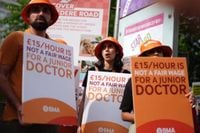Thousands of resident doctors in England have embarked on a five-day strike starting Friday, July 25, 2025, igniting one of the most significant industrial actions in recent NHS history. The British Medical Association (BMA) has called for the strike to press the government for a substantial pay rise, arguing that doctors’ salaries have been eroded by 20-21% in real terms since 2008. Up to 50,000 resident doctors, formerly known as junior doctors, are participating in the walkout, which is expected to disrupt patient care across the country.
The strike began at 7 a.m. and will continue until 7 a.m. on Wednesday, July 30. Resident doctors, who form nearly half of the medical workforce and are essential to hospital and clinic operations, took to picket lines outside NHS hospitals, including London’s St Thomas’ Hospital. Kelly Johnson, a striking doctor there, emphasized the gravity of the action: “When doctors decide to take strike action it’s always portrayed as though we’re being selfish, but we’re here as a body to help the public day in, day out, to work hours that don’t even end sometimes. Here we are just trying to get what’s right for us so we can do our best to serve the public.”
The BMA is demanding a 29.2% pay increase to restore salaries to 2008 levels, contending that the government’s recent 5.4% raise falls well short of reversing years of pay erosion. The union has highlighted a stark pay disparity between resident doctors and their non-medically qualified assistants, who can earn up to 30% more per hour despite less training and experience. In national newspaper adverts, the BMA pointed out that a newly qualified doctor earns about £18.62 per hour, while a physician assistant can earn over £24 per hour.
Despite the strike, the NHS has vowed to keep emergency services running. NHS England, under new chief executive Sir Jim Mackey, instructed hospitals to cancel non-urgent work only in exceptional circumstances and with prior approval, a shift from previous strikes that saw massive appointment cancellations. Some hospitals report that over 80% of non-urgent work continues, with senior doctors stepping in to cover for striking resident doctors. GP surgeries, urgent care, A&E departments, and NHS 111 services remain open and accessible to the public. Patients have been advised to “choose healthcare wisely” and will be notified if their appointments are affected.
However, the strike is expected to cause significant disruption. Previous industrial actions by resident doctors in 2023 led to the cancellation or rescheduling of an estimated 1.5 million appointments. This time, some large hospitals may have to cancel up to 25-50% of patient appointments in certain specialties. Hassnain Shahid, a father from Bradford, shared his frustration after his three-year-old daughter’s lung surgery was cancelled due to the strike, describing the experience as “an emotional rollercoaster.”
Prime Minister Sir Keir Starmer made a last-minute appeal to resident doctors on the eve of the strike, urging them not to follow the “damaging road” of industrial action. Writing in The Times, he warned that the strikes threatened to “turn back the clock on progress we have made in rebuilding the NHS” and would cause “real damage” to patients and staff. “Behind the headlines are the patients whose lives will be blighted by this decision,” he said, highlighting the risk of delayed treatment and late diagnoses. Starmer also pointed out that most people do not support the strikes, fearing the impact on healthcare services.
Health Secretary Wes Streeting echoed these sentiments, describing the strike decision as “reckless and needless.” In a personal letter to resident doctors, Streeting expressed regret over the situation but maintained the government’s stance against further pay rises beyond the recent 22% increase awarded over 2023-24 and 2024-25. He emphasized ongoing efforts to improve working conditions, student debt relief, exam fee support, and career progression but stated that pay was not open to negotiation. “This government came into office, just over a year ago, with a great deal of sympathy for the arguments that resident doctors were making about pay, working conditions and career progression,” Streeting wrote, affirming his commitment to progress while warning against allowing the BMA to “hold the country to ransom.”
The BMA’s co-chairs, Dr Melissa Ryan and Dr Ross Nieuwoudt, criticized the government’s refusal to negotiate pay during the strike days and accused the health secretary of failing to address the 21% pay erosion since 2008. They argued that restoring pay remains the simplest and most effective way to improve doctors’ working lives. Dr Ryan acknowledged the disruption caused by the strike, apologizing to patients and describing the decision as “difficult” but necessary given the financial pressures faced by doctors working long hours and unsociable shifts.
Public support for the strike is divided. A YouGov poll conducted just days before the strike found that 52% of the UK public opposed the industrial action, with opposition strongest among older age groups. Support has declined slightly since May 2024. Some doctors, like 33-year-old Adam Boggon, have voted against the strike, fearing harm to patients.
Political reactions have been mixed. The Liberal Democrats have called for an NHS strike resilience plan involving private hospitals to handle some elective treatments. The Conservative shadow health secretary, Stuart Andrew, condemned the strikes as a threat to hospital stability and criticized the Labour government’s previous pay deal as a “spineless surrender” that emboldened the BMA to demand more. Rory Deighton of the NHS Confederation placed responsibility for the strikes firmly on the BMA, lamenting the distress caused to patients.
Meanwhile, the Department of Health and Social Care (DHSC) challenged the BMA’s pay claims as “disingenuous,” noting that average annual earnings for resident doctors last year ranged from £43,275 in the first year to nearly £75,000 by the end of specialty training, including additional pay for night and weekend shifts.
As the strike unfolds, NHS managers, doctors, and patients brace for a challenging week ahead. The balance between pressing for fair pay and maintaining essential healthcare services remains delicate, with no immediate resolution in sight. The government has left the door open for talks on non-pay issues after the strike, but the impasse over pay continues to fuel tensions.
In the midst of this turmoil, the voices of resident doctors resonate clearly: they are fighting not only for themselves but for the future sustainability of the NHS. As Dr Melissa Ryan put it, “Doctors have spoken and spoken clearly. They won’t accept that they are worth a fifth less than they were in 2008. Our pay may have declined but our will to fight remains strong.”


